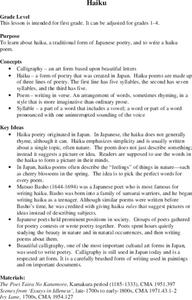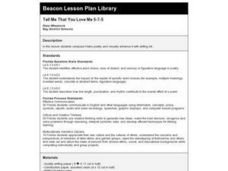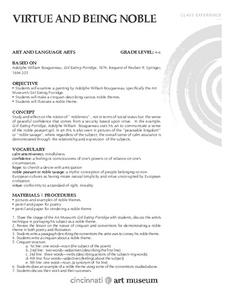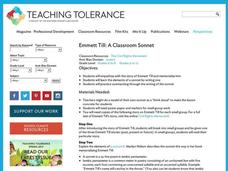Curated OER
English Exercises: Mysteries of Anatomy
Consider this online interactive activity as a way to practice the names that often accompany human anatomy, such as the crown of the head and the roof of the mouth. Learners select an anatomy word with a double meaning from a drop-down...
Curated OER
Analytical Essay
What is an analytical essay? Introduce this type of thinking to your young writers. First, discuss what it means to analyze something. Then, identify the different components of an essay and what details are embedded in each component....
Curated OER
Looking for Newton
Students discuss the rhyming pattern of various types of poetry. With a focus on limericks, they follow the specific rhyme scheme and create a limerick about Newton. They share their poem with the class and write another one related to...
Curated OER
Haiku
Students work collaboratively to create a class Haiku and illustrate the poem individually in this elementary school activity. The activity includes five possible enrichment activities.
Curated OER
Freddie the Fungus:A Play about Decomposers (Elementary, Computer)
First the class learns how to write a Haiku poem. Then, they use kidpix to illustrate their poem.
Curated OER
Insight Arts
Students view a mural and identify, describe, and discuss what they see. They are introduced to and demonstrate the functions of key structural elements of poetry by writing a poem about themselves that highlights their interests and...
Curated OER
Poet-Tree (or shrub or forb)
Middle schoolers write poetry to describe a noxious weed. They form a personal relationship with, and a better comprehension of weeds. Students explain what the basic elements of a haiku are. They describe a particular weed, and...
Curated OER
Tell Me That You Love Me 5-7-5
Students listen to several examples of Haiku poetry and discuss the strict format. Then students create and edit their own Haiku poems and enhance them with ink designs.
Curated OER
Nature and Haiku Poetry
Pupils compose haiku poems and recognize how cultures value nature and
natural forces through the study of Japanese poetry. This lesson includes a bibliography of resources.
Curated OER
Sonnet 130
Students identify and interpret the structural features of literature through the study, analysis and production of Poetry. Including the structural characteristics. Students write a sonnet including required elements, such as length,...
Curated OER
Book Report Haiku
Students study another method for writing a book report using a Haiku poem. In this book report lesson, students use the Haiku poem format to write a book report.
Curated OER
The Emperor and the Kite
Fourth graders explore storytelling by reading a classic story. In this vocabulary identification lesson, 4th graders read the story The Emperor and the Kite and define the different vocabulary terms that appear in the story. Students...
Curated OER
Sonnet Project
Twelfth graders use the internet to examine how the Gutenberg press affected society as a whole. Using examples of illuminated type, they develop type in three different formats. They share their types with the class and answer...
Curated OER
Bio-Poems
Fourth graders practice typing skills. They select favorite poetry and use word processing technology to type it. Students keep their hand on the home row and say the letters as they type from their written work. They use capitol...
Curated OER
Read "El Corrido de Gregorio Cortez"Americo Paredes version
Students see examples of other types of written stories. They are introduced to the ballad in literature. Students obtain ideas for their own family story. They discuss how ballads can relate true stories through music. Students discuss...
Curated OER
Through the Odyssey, Lesson 2:
Ninth graders complete their reading of "The Odyssey". Using the text, they write an essay on a topic of their choice relating to the book. They write a rough draft, first draft and final draft typed in a word processing program. They...
Curated OER
Creating and Presenting Haiku With Kid Pix
Students research the history and characteristics of haiku poetry using books and the Internet. They use Kid Pix to create and present original haiku.
Curated OER
Can You Haiku?
Everyone loves haikus! They're short, quick, and fun to write! Analyze the rules and conventions of haiku. Readers interpret examples of haiku and develop a vocabulary for writing haiku. Then they compose a haiku based on a personal...
Curated OER
Sonnet Worksheet
Are your middle schoolers writing a sonnet? Here's a learning exercise to help them craft their first sonnet! Make edits as you see necessary.
Curated OER
Synecdoche vs. Metonymy: Definitions
Ask your class to lend their ears, and eyes, to a short video that defines and offers examples of synecdoche and metonymy. Whether it be brand names like Kleenex® and Band-aids® that have come to stand for all the products in a category,...
Curated OER
Virtue And Being Noble
Students write and illustrate original cinquains based upon the ideas of nobility and virtue. The instructional activity includes a vocabulary list of key terms and rubric for student reflection and assessment. This is intended for a 4th...
Curated OER
Emmett Till: A Classroom Sonnet
Who is Emmet Till? An important historical figure, your kids will be shocked by his story! Discover the details of his life and collaborate to write a crown of sonnets in the style of Marilyn Nelson.
Curated OER
Shakespeare Limericks 3
While this Fun Trivia online quiz has little educational merit, the idea of writing limericks to describe Shakespeare's plays is not only fun, but also has academic value. It's worth taking a look!
Other popular searches
- Types Lyric Poetry
- Types of Poetry
- Types of Poetry Powerpoint
- Types Lyrical Poetry
- Different Types of Poetry
- 6 Types Lyric Poetry
- Identify Types of Poetry
- Word Search Types of Poetry
- Different Poetry Types
- Types Poetry Word Search
- Word Search: Types of Poetry
- Poetry Types Worksheet

























